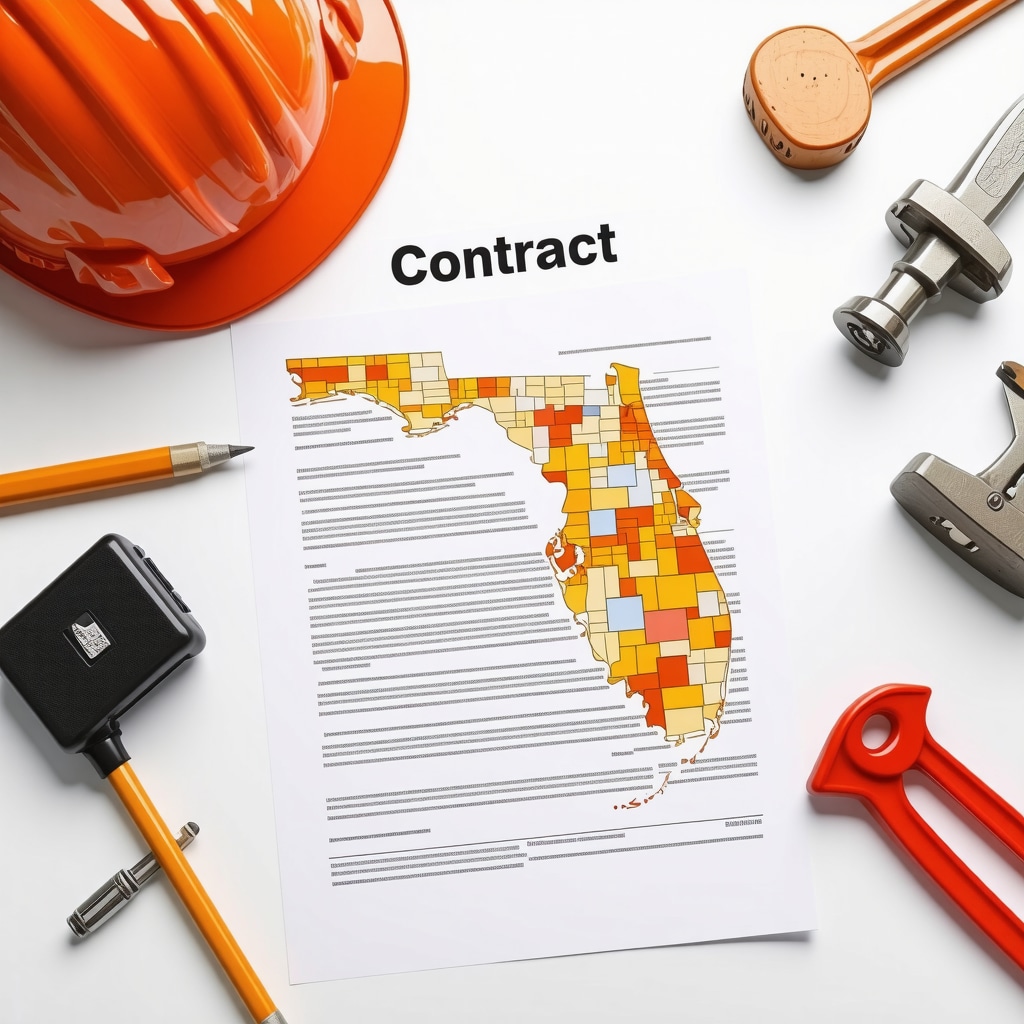Unlocking the Secrets Behind Contractor Contracts: What Tampa Homeowners Must Know
Embarking on a home renovation or repair project in Tampa can be thrilling yet daunting. One of the most critical foundations for a successful project is understanding the contractor contract—a document that often holds the key to protecting your investment and ensuring your vision becomes reality. In 2024, with evolving legal standards and market nuances, Tampa homeowners need expert guidance on contractor contract basics to navigate this essential agreement confidently.
Beyond the Fine Print: Key Elements Every Tampa Contract Should Include
While contractor contracts may seem like a mountain of legal jargon, savvy homeowners recognize that these agreements are blueprints for accountability and transparency. A well-crafted contract typically details scope of work, timelines, payment schedules, material specifications, and dispute resolution mechanisms. For Tampa residents, considering local building codes and Florida’s regulatory environment is paramount. For instance, including clauses about licensing and insurance protections can shield you from potential liabilities and ensure compliance with Florida’s stringent home improvement laws.
What Questions Should Tampa Homeowners Ask Before Signing a Contractor Contract?
Understanding what to inquire about can empower homeowners to avoid common pitfalls. Essential questions include: Is the contractor licensed and insured in Tampa? How are change orders handled if project scope shifts? What warranties are provided on workmanship and materials? How is communication managed throughout the project? These queries not only clarify expectations but also reflect the contractor’s professionalism and reliability. For deeper insights on hiring licensed professionals, explore licensed general contractor services in Tampa.
Practical Tips to Safeguard Your Home Investment Through a Solid Contract
Experience teaches that the most successful renovations begin with a contract that leaves no room for ambiguity. Tampa homeowners should insist on detailed documentation of every project phase, including payment milestones linked directly to completed work. Incorporating provisions for unforeseen circumstances such as weather delays or supply shortages is also wise. Moreover, confirming the contractor’s compliance with Tampa’s construction regulations can prevent costly legal disputes. This approach mirrors best practices advocated by the Florida Home Builders Association, ensuring your project aligns with industry standards.
How Does a Contractor Contract Protect Tampa Homeowners from Disputes?
Disagreements often arise from miscommunication or unmet expectations. A comprehensive contract preempts these issues by clearly defining roles, responsibilities, and remedies. It serves as a legal safeguard should conflicts escalate, outlining procedures for mediation or arbitration before resorting to litigation. For Tampa residents, this clarity is invaluable given the dynamic nature of construction projects and the complexity of local regulations. Understanding these protective layers elevates your confidence in managing home improvement ventures.
For those planning bathroom or kitchen renovations, learning more about specialized contractors can be invaluable. Check out expert advice on bathroom remodel contractors in Tampa or explore current trends with local kitchen remodel experts.
If you’re ready to take the next step in securing a trustworthy contract or have experiences to share, reach out to Tampa’s trusted contractors or leave a comment below to join the conversation.
Authoritative source: Florida Department of Business & Professional Regulation offers comprehensive guidelines on contractor licensing and contract requirements, providing a valuable resource for homeowners seeking to understand legal protections in Florida’s construction industry (DBPR Official Site).
Personal Lessons Learned: Why I Now Ask More Questions Before Signing
Reflecting on my own renovation journey, I vividly remember the anxiety that came with signing the first contractor contract. I assumed the document was just a formality, but quickly learned that asking the right questions upfront could have saved me time and stress. One key lesson I learned was the importance of verifying the contractor’s licensing and insurance status—something I initially overlooked, which led me to licensed general contractor services in Tampa for a subsequent project. This step not only gave me peace of mind but also ensured compliance with Florida’s strict guidelines.
How Can You Protect Yourself from Unexpected Costs?
One question that I now always ask contractors is about handling change orders and unforeseen expenses. Renovations rarely go exactly as planned, so knowing how additional costs will be managed is crucial. For instance, will there be a written change order process? Can you expect a cap on extra charges? Having these details in writing prevents surprises and keeps your budget intact. The affordable home renovation experts in Tampa often emphasize the value of clear communication regarding financial matters.
Ever Wondered How to Navigate Delays and Disruptions Smoothly?
Delays are almost inevitable in construction, but how they’re addressed can make a world of difference. I once faced a project setback due to supply chain issues, and because my contract included provisions for such circumstances, negotiations stayed amicable. Including clauses about weather delays, material availability, and timeline adjustments can save headaches later. It’s worth discussing these upfront to understand how flexible and responsive your contractor will be.
Why Is Communication Style as Important as the Contract Itself?
Beyond the paperwork, the way your contractor communicates can influence your project’s success. I prefer contractors who provide regular updates and are accessible for questions. This openness helped me stay informed and involved, turning a potentially stressful experience into a collaborative one. When interviewing contractors, consider asking about their communication methods and frequency. It’s a simple step that pays off enormously in trust and transparency. If you’re interested in expert advice on remodeling communication, check out local kitchen remodel pros’ insights for 2025.
Have you had experiences where a contractor contract either saved the day or caused complications? Share your stories or questions below—your input could help fellow Tampa homeowners navigate their own projects more confidently!
Advanced Risk Mitigation Strategies Embedded in Tampa Contractor Contracts
Beyond the essential contract components, Tampa homeowners aiming for sophisticated risk management should consider integrating advanced clauses that anticipate and mitigate potential project pitfalls. For example, including detailed indemnification provisions and explicit liability caps can protect homeowners from unforeseen claims or damages arising during or after the construction process. Furthermore, embedding a “force majeure” clause tailored to Florida’s climatic realities—such as hurricanes or tropical storms—provides contractual relief options if such events disrupt timelines or escalate costs.
Another strategic inclusion is a comprehensive insurance verification process embedded within the contract, ensuring that the contractor’s coverage for workers’ compensation, general liability, and builder’s risk insurance remains valid and effective throughout the project lifecycle. This vigilant approach helps safeguard homeowners against financial exposure due to accidents or property damage.
Integrating Florida-Specific Legal Nuances into Contractor Agreements
Florida’s construction laws carry unique stipulations that savvy Tampa homeowners must embed into their contracts to ensure enforceability and compliance. For instance, Florida Statute 713 mandates specific notice requirements for lien waivers and payment claims, which should be explicitly referenced within the contract to prevent future disputes over payments or liens.
Moreover, Florida law requires licensed contractors to adhere to stringent licensing disclosures and advertising regulations. Ensuring these disclosures are documented within the contract not only complies with statutory requirements but also empowers homeowners with transparency regarding the contractor’s credentials and authority to perform the work.
What Are the Best Practices for Enforcing Change Orders in Tampa Renovation Contracts?
Change orders often represent a critical juncture where projects can either smoothly adapt or spiral into conflict. Best practices dictate that change orders must be in writing, clearly delineate the scope alterations, associated costs, and revised timelines, and receive formal approval from both parties before implementation. Including a standardized change order form as an addendum to the contract can streamline this process, reducing ambiguity.
Additionally, Tampa homeowners should negotiate caps on cumulative change order costs to maintain budget control. A clause specifying a maximum allowable percentage increase can prevent contractors from exploiting change orders as a means of inflating project expenses.
Leveraging Expert Resources for Contract Review and Dispute Resolution
Engaging legal professionals specializing in Florida construction law can significantly elevate your contract’s robustness. These experts can dissect complex clauses, validate compliance with local statutes, and tailor dispute resolution pathways such as mediation or arbitration to fit your project’s unique profile.
The American Bar Association’s Construction Law section offers extensive resources and referrals to qualified attorneys skilled in drafting and reviewing residential contractor contracts (ABA Construction Law). Utilizing such resources can empower Tampa homeowners to secure contracts that not only protect their interests but also enhance collaboration with contractors.
For those seeking to deepen their understanding or require personalized contract assessments, consulting with Tampa’s leading construction law experts is a prudent next step. Connect with seasoned professionals now to fortify your remodeling journey.

Elevating Contractual Safeguards with Data-Driven Risk Analytics
In today’s dynamic Tampa construction landscape, integrating data-driven risk analytics into contractor contracts offers a cutting-edge advantage. By leveraging predictive modeling based on historical project data, homeowners and contractors can forecast potential project delays, budget overruns, and compliance risks. Embedding clauses that reference these analytics encourages proactive mitigation strategies, fostering transparency and accountability beyond traditional contractual terms.
How Can Homeowners Employ Predictive Risk Models to Enhance Contractual Protections?
Advanced homeowners in Tampa increasingly seek to incorporate predictive risk models into their contract negotiations. This involves requiring contractors to share risk assessment reports that evaluate factors like supply chain vulnerabilities, labor availability, and weather patterns specific to Florida’s climate. Contract provisions can mandate adjustments or contingency planning based on these insights, effectively transforming contracts into living documents responsive to evolving project realities.
For an authoritative perspective on integrating such sophisticated risk management tools in construction contracts, consult the National Academies Press publication on Data-Driven Risk Management in Construction Projects.
Harnessing Blockchain Technology for Immutable Contract Transparency
Blockchain introduces an innovative paradigm in Tampa contractor agreements by enabling immutable, time-stamped records of contract terms, change orders, and payment milestones. This technology enhances trust by preventing post-signature alterations and facilitating real-time visibility for all stakeholders. Forward-thinking Tampa homeowners can explore contracts underpinned by smart contracts—self-executing agreements programmed to enforce terms automatically upon condition fulfillment.
Adopting blockchain mechanisms not only deters disputes but also streamlines verification during audits or legal proceedings, positioning Tampa homeowners at the forefront of construction contract innovation.
Decoding Intellectual Property Rights Within Renovation Contracts
Beyond physical alterations, some Tampa renovation projects involve custom design elements, proprietary plans, or innovative building techniques. Savvy homeowners should ensure their contracts explicitly address intellectual property (IP) rights, delineating ownership of architectural drawings, digital designs, and unique construction methodologies. This prevents unauthorized use or replication post-completion and secures the homeowner’s investment in distinctive property enhancements.
Deploying Escrow Accounts for Enhanced Financial Security
To further protect Tampa homeowners from payment disputes and contractor defaults, the deployment of escrow accounts is an advanced contractual strategy. Funds are held by a neutral third party and disbursed only upon verified completion of predefined milestones. This mechanism encourages timely, quality work while safeguarding homeowner capital, especially in high-value or multi-phase renovations.
Utilizing Mediation Clauses to Expedite Conflict Resolution
While arbitration and litigation remain options, including detailed mediation clauses tailored to Tampa’s construction context can facilitate faster, less adversarial dispute resolution. Specifying qualified mediators familiar with Florida’s construction statutes and contractual norms ensures that conflicts are addressed by knowledgeable professionals, preserving relationships and minimizing project disruption.
Exploring these mediation frameworks through resources like the Florida Bar Association’s Continuing Legal Education on Construction Mediation can empower homeowners to negotiate more resilient contract terms.
Call to Action: Elevate Your Tampa Home Renovation Contract Today
Armed with these advanced insights, Tampa homeowners are uniquely positioned to transform standard contractor contracts into powerful, adaptive agreements that preempt risks and foster seamless collaboration. Don’t leave your investment to chance—engage with expert legal and construction professionals to tailor your contract with these sophisticated strategies. Connect with Tampa’s leading contractor and legal experts now to secure a future-proof renovation experience.

Frequently Asked Questions (FAQ)
What key components should every Tampa contractor contract include?
Every Tampa contractor contract should clearly outline the scope of work, project timelines, payment schedules, material specifications, licensing and insurance verification, change order procedures, warranty details, and dispute resolution mechanisms. Including Florida-specific legal requirements such as lien waiver notices and licensing disclosures is essential to ensure compliance and protect homeowner interests.
How do change orders work in Tampa renovation contracts?
Change orders must be documented in writing, specifying any changes to the original scope, cost, and timeline. Both homeowner and contractor must formally approve these changes before work begins. Best practices include using standardized change order forms and negotiating caps on cumulative change order expenses to avoid budget overruns.
What protections do contractor contracts offer against disputes?
Comprehensive contracts establish clear roles, expectations, and remedies, reducing miscommunication. They often include mediation or arbitration clauses to resolve conflicts efficiently before litigation. Contracts also define procedures for handling delays, unexpected costs, and quality assurance, providing Tampa homeowners with legal recourse and peace of mind.
Why is verifying a contractor’s license and insurance crucial?
Verifying licensing ensures the contractor is authorized and knowledgeable about Florida’s construction codes, reducing legal risks. Insurance confirmation protects homeowners from liability related to accidents, property damage, or worker injuries during the project. These verifications safeguard investments and comply with Florida regulatory standards.
Can modern technologies like blockchain improve contractor contracts?
Yes, blockchain can enhance contract transparency and security by creating immutable, time-stamped records of agreements, change orders, and payments. Smart contracts can automate enforcement of terms upon meeting conditions, minimizing disputes and ensuring accountability throughout the Tampa renovation process.
How can Tampa homeowners manage risks related to Florida’s climate in contracts?
Including tailored “force majeure” clauses addressing hurricanes, tropical storms, and weather delays allows contractual flexibility in timelines and costs during such events. Data-driven risk analytics and contingency planning embedded in contracts further help anticipate and mitigate climate-related disruptions specific to Florida.
What role do escrow accounts play in Tampa renovation contracts?
Escrow accounts hold funds with a neutral third party, releasing payment only upon verified completion of agreed milestones. This protects homeowners from premature payments and contractor defaults, ensuring financial security especially in high-value or phased projects.
When should homeowners seek legal review of their contractor contracts?
Engage a legal expert experienced in Florida construction law before signing to ensure compliance, clarify complex clauses, and establish effective dispute resolution methods. Early legal review helps tailor contracts to project specifics, preventing costly misunderstandings and enhancing homeowner protection.
How important is communication style between homeowners and contractors?
Effective communication fosters transparency and trust, enabling timely updates and swift resolution of issues. Clarifying communication frequency and methods in the contract or preliminary discussions can prevent misunderstandings and improve collaboration throughout the project.
What intellectual property considerations should Tampa homeowners be aware of?
Contracts should explicitly define ownership rights of custom designs, architectural plans, and proprietary construction techniques to avoid unauthorized use or replication after project completion. Clear IP clauses protect the homeowner’s investment in unique property enhancements.
Trusted External Sources
- Florida Department of Business & Professional Regulation (DBPR) – Offers authoritative guidelines on contractor licensing, insurance requirements, and regulatory compliance crucial for Tampa homeowner protections.
- Florida Home Builders Association (FHBA) – Provides best practice standards and educational resources on construction contracts and industry norms in Florida.
- American Bar Association (ABA) Construction Law Section – A leading legal resource for contract drafting, dispute resolution strategies, and Florida construction law expertise.
- National Academies Press: Data-Driven Risk Management in Construction Projects – Presents advanced methodologies for integrating predictive analytics into construction risk mitigation.
- Florida Bar Association Continuing Legal Education (CLE) on Construction Mediation – Offers specialized training and frameworks for effective mediation tailored to Florida’s construction disputes.
Conclusion
Securing a well-structured contractor contract is paramount for Tampa homeowners aiming to protect their renovation investments and navigate Florida’s unique legal and environmental landscape. From fundamental clauses covering scope and payments to advanced provisions integrating risk analytics, blockchain transparency, and tailored dispute resolution, these contracts serve as dynamic tools to align expectations and mitigate risks. Engaging licensed and insured contractors, demanding clear communication, and leveraging expert legal counsel further fortify your project’s success in 2024 and beyond. Empower your Tampa renovation journey by transforming standard agreements into comprehensive, adaptive contracts that safeguard your home and peace of mind. Share your experiences, ask questions, and explore expert resources to stay informed and confident throughout your home improvement ventures.

As someone who recently completed a home renovation in Tampa, I can’t stress enough the importance of a detailed contractor contract. Initially, I underestimated how critical it is to understand and negotiate the scope of work, timelines, and especially change order procedures. My project encountered unforeseen material delays, and thankfully, our contract had clear clauses about supply shortages and timeline adjustments, which helped keep disputes at bay. Moreover, verifying the contractor’s licensing and insurance upfront gave me peace of mind throughout the project. I also appreciated having payment milestones tied to completed work rather than dates, ensuring accountability at every stage. However, one thing I found challenging was communication consistency—sometimes updates were sporadic, which added unnecessary stress. I’d love to hear how other Tampa homeowners manage contractor communication during renovations? Do you prefer scheduled updates, or more ad-hoc check-ins? Also, has anyone explored using technologies like digital contracts or even blockchain to improve transparency and reduce disputes? It seems like a promising avenue given our local construction market’s complexities.